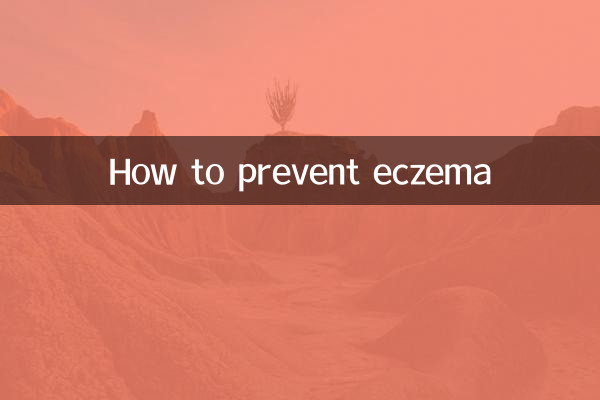How to prevent eczema
Eczema is a common skin inflammation characterized by redness, itching, dryness and even flaking. In recent years, with changes in the environment and increased stress in life, the incidence of eczema has increased. This article will provide you with a structured guide to preventing eczema based on the hot topics and hot content on the Internet in the past 10 days.
1. Common causes of eczema

There are many causes of eczema, including environmental factors, lifestyle habits and genetic factors. The following are the recently discussed triggers of eczema:
| type of trigger | Specific performance |
|---|---|
| environmental factors | Dry climate, air pollution, pollen allergies |
| living habits | Excessive cleansing, use of harsh skin care products, improper diet |
| genetic factors | Family history of allergies, immune system abnormalities |
2. Practical methods to prevent eczema
According to recent suggestions from popular health bloggers and the opinions of medical experts, you can prevent eczema from the following aspects:
1. Keep skin moist
Dryness is one of the main triggers of eczema, so moisturizing is key. It’s recommended to choose a fragrance-free, alcohol-free moisturizer, especially one that contains ceramides or hyaluronic acid.
| Recommended moisturizing products | Applicable people |
|---|---|
| Vaseline | Dry skin, sensitive skin |
| cetaphil moisturizing cream | Available for both children and adults |
| Avène Soothing Special Cream | Extremely sensitive skin |
2. Avoid contact with irritating substances
Recent hot searches show that many people develop eczema due to the use of skin care products containing alcohol or fragrance. It is recommended to choose mild cleaning products and reduce the number of frequent hand washing or bathing.
3. Adjust your diet
Certain foods may aggravate eczema symptoms, such as spicy foods, seafood, dairy products, etc. Recently health bloggers have recommended the following dietary changes:
| food type | Suggestions |
|---|---|
| spicy food | reduce intake |
| seafood | Avoid if allergic to |
| Foods rich in Omega-3 | Such as deep-sea fish and flaxseed oil, which can help fight inflammation |
4. Reduce stress
Recent research shows that stress can worsen eczema symptoms. It is recommended to relieve stress through exercise, meditation or listening to music.
3. Response measures when eczema breaks out
If eczema has flared up, you can take the following steps to relieve symptoms:
| Symptoms | Coping methods |
|---|---|
| itching | Apply cold compress or calamine lotion |
| Redness and swelling | Use low-dose hormone ointments (doctor's guidance required) |
| Desquamation | Enhance moisturizing and avoid scratching |
4. Summary
Preventing eczema requires addressing many aspects of daily life, including moisturizing, avoiding irritations, adjusting your diet, and reducing stress. If symptoms are severe, it is recommended to seek medical treatment promptly. I hope this article can help you stay away from eczema and have healthy skin!

check the details

check the details